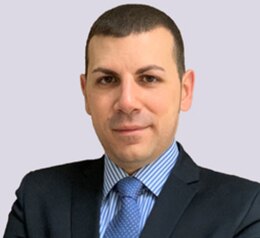9th Edition
World Heart Congress
THEME: "Heartbeat of Change: Inspiring Solutions for Global Cardiac Health"
 17-18 Nov 2025
17-18 Nov 2025  Dubai, UAE (Collaboration with the Armenian Cardiologists Association)
Dubai, UAE (Collaboration with the Armenian Cardiologists Association) THEME: "Heartbeat of Change: Inspiring Solutions for Global Cardiac Health"
 17-18 Nov 2025
17-18 Nov 2025  Dubai, UAE (Collaboration with the Armenian Cardiologists Association)
Dubai, UAE (Collaboration with the Armenian Cardiologists Association) 
Essex Cardiothoracic Centre, United Kingdom
Title: Outcome of Major Aortic Surgery in Elderly Patients
He is an accredited and highly experienced Cardiothoracic Surgeon with a distinguished career spanning over a decade. He completed his specialist training in cardiac surgery in Italy, earning his Certificate of Completion of Training (CCT) with honors in 2010.Following his training, he relocated to the United Kingdom, where he undertook several prestigious fellowships in internationally renowned cardiothoracic centers, including Harefield Hospital, St. George’s Hospital, and Bart’s Heart Centre. These advanced fellowships provided him with extensive expertise in complex cardiac surgical procedures and further enhanced his clinical and academic profile. For the past nine years, he has been serving as a Consultant Cardiac Surgeon in the UK, delivering high-quality care within both the National Health Service (NHS) and the private sector. His NHS practice is based at The Essex Cardiothoracic Centre, a leading institution for cardiac care, while he also provides private services at The Harley Street Clinic, one of London’s most respected private hospitals. Throughout this career, he has remained committed to clinical excellence, patient-centered care, and ongoing professional development in the field of cardiothoracic surgery.
Introduction: Major aortic Surgery is one of the challenges faces cardiac surgeons. High mortality and morbidity represent a feature of both elective and emergency aortic cases in elderly patients due to the high risk of these procedure in comparison with younger population.
Methodology: This is analysis between two groups of patients over two period of time, first was between October 2014 and September 2016 which was published by our unit and the added analysis for the year 2024. The patients were divided into two groups, those under 70 years old (group A) and above 70 years old (group B). Demographics, admission length, complication and mortality data were collected for each group and spastically analyzed.
Conclusion: There was no significant difference in post-operative outcomes for old patients compared with their younger counterparts younger than 70 years, despite this group having more complex aortic surgery and having higher predictive risk. Both elective and emergency surgeries should be considered in the older patients, age itself shouldn’t be used as the sole exclusion criteria.